

Attorney Jessie Paluch, founder of TruLaw, has over 25 years of experience as a personal injury and mass tort attorney, and previously worked as an international tax attorney at Deloitte. Jessie collaborates with attorneys nationwide — enabling her to share reliable, up-to-date legal information with our readers.
Legally ReviewedThis article has been written and reviewed for legal accuracy and clarity by the team of writers and legal experts at TruLaw and is as accurate as possible. This content should not be taken as legal advice from an attorney. If you would like to learn more about our owner and experienced injury lawyer, Jessie Paluch, you can do so here.
Fact-CheckedTruLaw does everything possible to make sure the information in this article is up to date and accurate. If you need specific legal advice about your case, contact us by using the chat on the bottom of this page. This article should not be taken as advice from an attorney.
Understanding the basics of SSDI lawsuits is important for those seeking financial assistance through SSDI benefits.
To qualify for SSDI, a claimant must meet the Social Security Administration’s criteria for visual impairments.
They must also have a disability that prevents them from working for at least 12 months or results in death during a national emergency or pandemic.
Having a lawyer for your SSDI case is paramount when it comes to lawsuits and civil filings.

An experienced SSDI attorney can guide you through the process, ensuring you understand your rights and options.
They can also help with paperwork, gather evidence, and assist with the appeals process if needed.
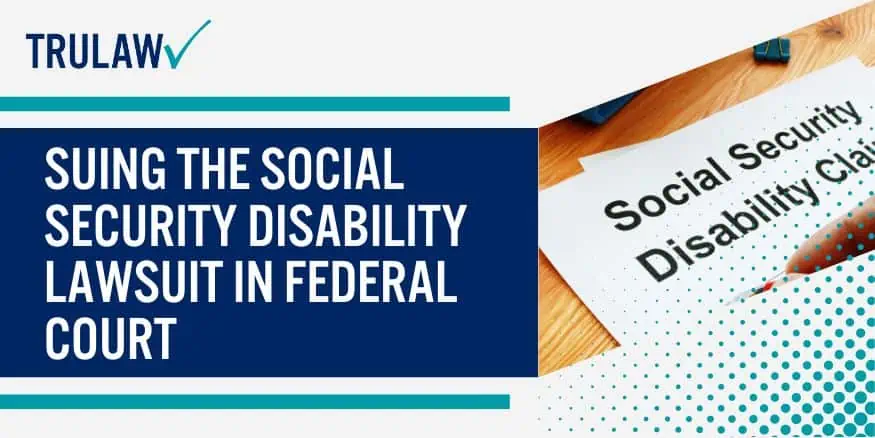
Claimants who have been denied or delayed disability claims by the Social Security Administration (SSA) can file lawsuits in federal district court.
To do so, they must file a notice of complaint in the appropriate district court.
Then follow specific procedures with the help of disability lawyers.
It is important for claimants to understand the process and consult with an experienced attorney in Social Security Disability.
Law to navigate this complex legal process effectively.
Before filing a lawsuit, claimants should consider notice and the impact of the pandemic and person’s employment history.
They should first check if they have exhausted all administrative remedies with the SSA.
This involves going through all levels of appeal within the agency to receive proper notice.
Claimants should also assess their chances of success based on their circumstances and evidence.
Consulting with an SSDI attorney can provide valuable insight into the strength of their case and potential outcomes.
Giving notice to an attorney is important for guidance.
Additionally, initiating a class-action lawsuit against the SSA may be an option for those facing similar challenges.
By joining forces with others affected by wrongful denials or delays and settlement proceeds spending, individuals can collectively seek justice.
When pursuing a Social Security Disability Lawsuit in federal law court, claimants challenge decisions made by Administrative Law Judges (ALJs) within the SSA.
These ALJs determine eligibility for benefits under Title XVI of the Social Security Act (SSI).
Claimants present arguments and evidence to persuade district courts that their denial or delay was unjustified.
Thorough preparation and presentation of medical records, expert opinions, and relevant documentation are essential.
Claimants may have the opportunity to present their case before a judge, who will evaluate the evidence and make a final decision.
Being well-prepared for this stage is crucial as it can significantly impact the lawsuit’s outcome.

Plaintiffs, who are individuals seeking Social Security Disability Insurance (SSDI) or Supplemental Security Income (SSI) benefits.
Sometimes find themselves in a frustrating situation when their claims are wrongfully denied by the Social Security Administration (SSA).
In such cases, these claimants have the right to take legal action for disability claims and sue the SSA to challenge the denial and seek the benefits they believe they deserve.
Wrongful denials of Social Security disability claims can happen for various reasons.
From lack of medical evidence, administrative errors, or misinterpretation of eligibility criteria.
In social security disability cases, evidence is crucial in proving that a plaintiff qualifies for benefits.
Claimants should collect thorough medical records showing their impairments and how they affect their work.
This includes doctor’s reports, test results, treatment history, and other relevant medical documents.
Having detailed statements from friends or family members who can confirm the claimant’s limitations can greatly strengthen their case.
These statements should highlight specific instances where the disability affects their daily activities or work performance.
Plaintiffs may also want to obtain expert opinions from medical professionals who specialize in their specific impairments.
These experts can provide objective assessments of the claimant’s condition and its impact on their ability to work.
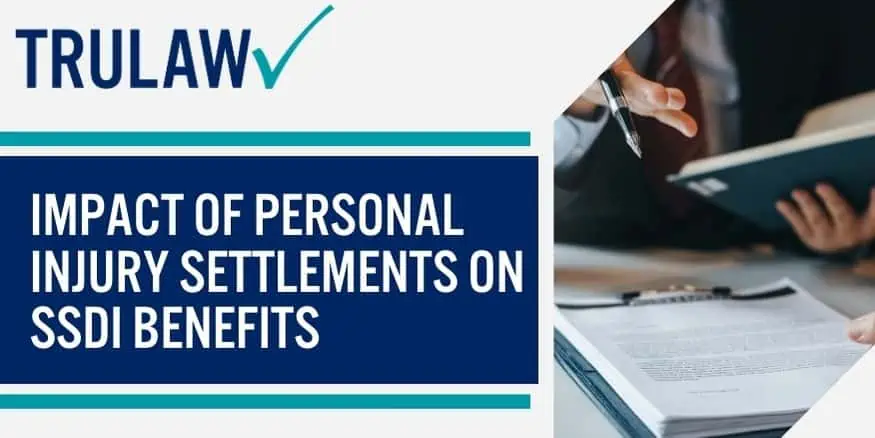
Understanding how personal injury settlements can affect SSDI benefits is crucial for individuals who rely on Social Security Disability Insurance (SSDI) payments.
When someone receives a settlement from a Social Security disability lawsuit, it can potentially impact their eligibility and the amount they receive in SSDI benefits.
Several factors come into play when determining if and how much the settlement will affect these benefits.
However, there are strategies available to minimize the impact and ensure individuals continue to receive the support they need.
This can benefit individuals who receive SSDI benefits by reducing the impact on their monthly income.
Here are the strategies to minimize the impact of personal injury settlements on SSDI payments:
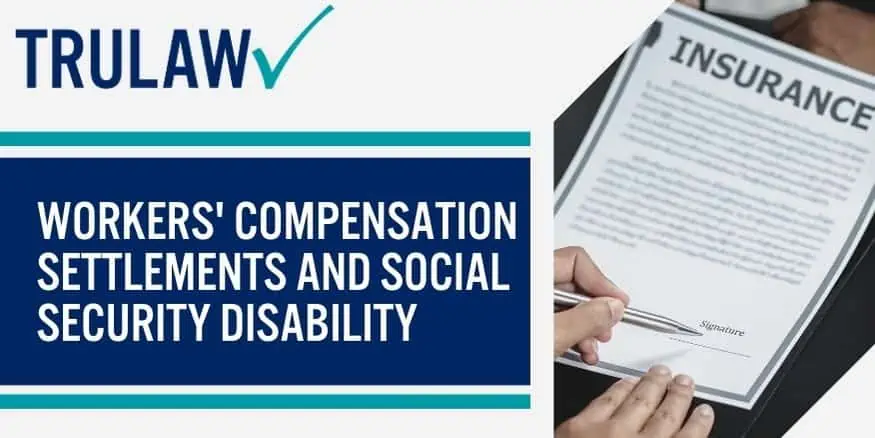
Exploring the relationship between workers’ compensation settlements and SSDI benefits, it is crucial to understand how these two systems interact.
When an individual suffers a work-related injury or illness, they may be entitled to receive both workers’ compensation benefits and Social Security Disability Insurance (SSDI) payments.
However, the receipt of one type of benefit can impact the eligibility for the other.
Receiving workers’ compensation may impact SSDI eligibility. The SSA views workers’ compensation as “offset income.”
Therefore, if an individual receives workers’ compensation benefits, their SSDI payments may decrease.
The SSA uses a formula to determine the reduction in SSDI payments.
They compare the combined amount an individual receives from both sources to their average earnings before becoming disabled.
If this total exceeds 80% of their previous earnings, the SSDI payment will be reduced accordingly.
When someone receives both workers’ comp and SSDI benefits simultaneously, coordination between these two systems becomes essential.
It is crucial to understand that while there might be an offset between these benefits, it does not necessarily mean individuals will lose all their disability benefits.
Workers’ compensation settlements may reduce SSDI payments, but they do not affect other social security benefits like retirement pensions or survivor benefits. Only disability insurance benefits may be offset.
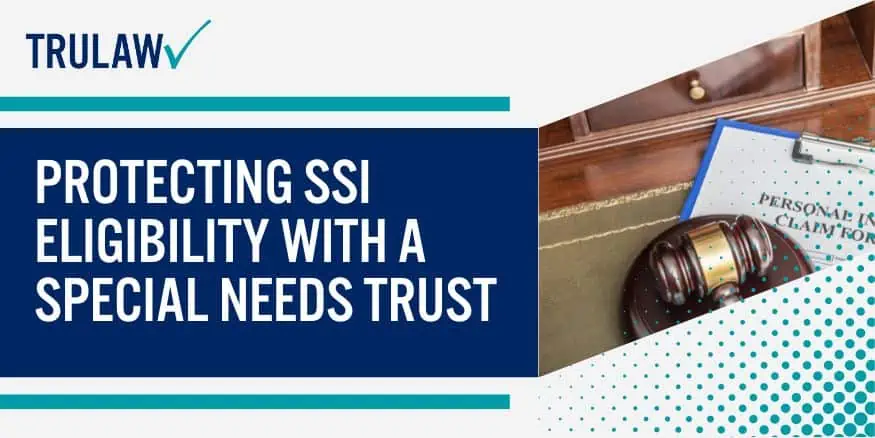
Supplemental Security Income (SSI) benefits provide crucial financial assistance to individuals with disabilities.
However, navigating the complexities of SSI eligibility can be challenging, especially.
One effective strategy for safeguarding SSI benefits while receiving additional support is by utilizing a special needs trust.
A special needs trust helps people with disabilities keep their SSI benefits while still receiving other financial support.
By putting assets into this trust, their resources won’t be counted against them when determining eligibility for SSI.
This approach has two main advantages: it lets them keep their SSI benefits for daily living expenses and healthcare.
It allows them to receive extra financial assistance without losing eligibility for government programs like Medicaid or housing subsidies.
When assets are placed into a special needs trust, they are not counted toward determining SSI eligibility.
This means that the funds in the trust do not affect income or resource limits.
By using a special needs trust, individuals can receive gifts, inheritances, settlements, or income without losing their SSI benefits.
These funds can be used to improve their quality of life by covering additional expenses.
If you want to learn more about Social Security disability lawsuits, contact us!
Establishing a special needs trust is important for protecting SSI eligibility.
However, it is equally crucial to properly administer and manage the trust.
Mishandling the trust could result in disqualification from SSI benefits.
To avoid this, it is recommended to consult with an experienced attorney who specializes in disability law and special needs trusts.
They can help navigate the complexities of trust administration and ensure compliance with legal requirements.
Ongoing management of the trust is essential.
Trustees must keep accurate records of expenses and use funds solely for approved purposes.
Regular communication between trustees and beneficiaries is important to ensure the trust aligns with the beneficiary’s changing needs.
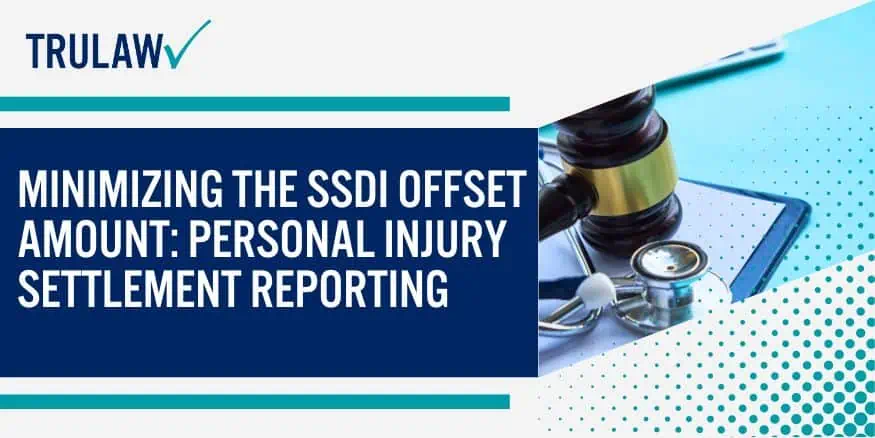
Understanding how reporting personal injury settlements can affect the SSDI offset amount is crucial.
Failure to accurately report these settlements can result in significant reductions in benefits and potential penalties.
Reporting SSDI and lawsuit settlements is essential because they can lead to benefit offsets or reductions in your SSDI payments.
The Social Security Administration (SSA) considers any income you receive from a settlement as “unearned income.”
This means that if you fail to report your settlement promptly, the SSA may reduce your monthly benefits by an amount equivalent to what you received through the settlement.
To avoid such reductions, it is critical to understand how reporting personal injury settlements affects your SSDI offset amount.
By promptly notifying the SSA about any changes in your financial circumstances, you can ensure that they adjust your benefits accordingly.
Minimizing the impact of settlement reporting on SSDI payments requires careful planning and adherence to specific strategies.
Accurate reporting is vital because failure to report personal injury settlements can lead to serious consequences.
The SSA actively monitors individuals’ financial situations, and if they discover unreported settlements, they may impose penalties such as repayment demands or even criminal charges.
By accurately reporting your personal injury settlement, you demonstrate transparency and compliance with SSDI requirements.
If you want to learn more about how to file a lawsuit against Social Security disability, contact us!
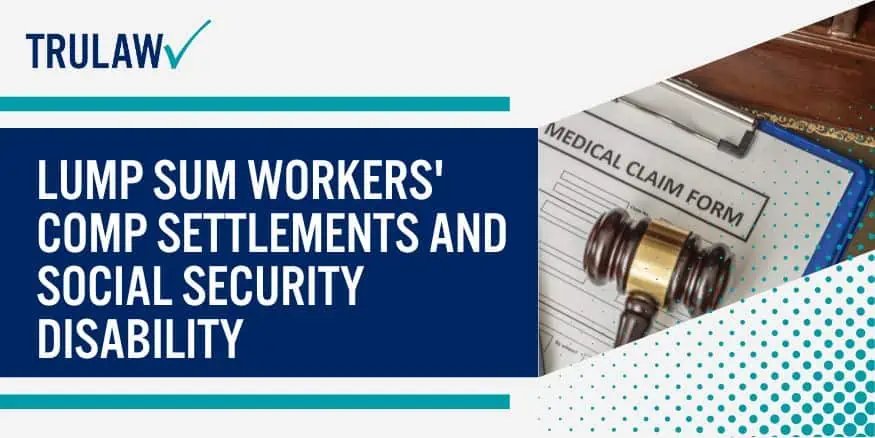
Workers who are injured on the job often rely on both workers’ compensation benefits and Social Security Disability Insurance (SSDI) to help them financially during their recovery.
However, when a worker receives a lump sum settlement from their workers’ comp claim, it can have implications for their ongoing SSDI benefits.
When an individual receives a lump sum settlement from their workers’ compensation claim, it is crucial to understand how it may affect their eligibility for SSDI benefits.
The settlement amount received can be considered as unearned income, which may impact the recipient’s eligibility for certain government assistance programs.
Typically, when someone receives a lump sum settlement, they have several options for managing the funds.
Some individuals choose to receive the entire settlement amount upfront in a lump sum payment.
Others opt for structured payments through annuities that provide a steady income over time.
It is important to note that regardless of the chosen method, these funds could potentially affect an individual’s eligibility for SSDI.
One key consideration is whether the lump sum settlement exceeds a certain threshold known as the resource limit.
If an individual’s total resources exceed this limit after receiving a lump sum settlement, they might face potential reductions or even loss of their ongoing SSDI payments.
To address this issue, individuals may need to explore options such as a simplified waiver or spend-down provisions.
A simplified waiver allows recipients to exclude specific assets from being counted towards their resources when determining eligibility for government programs like SSDI.
On the other hand, spend-down provisions allow individuals to use excess funds within a specified period without affecting their eligibility.
Navigating the coordination between workers’ comp and SSDI can be complex, especially when a lump sum settlement is involved.